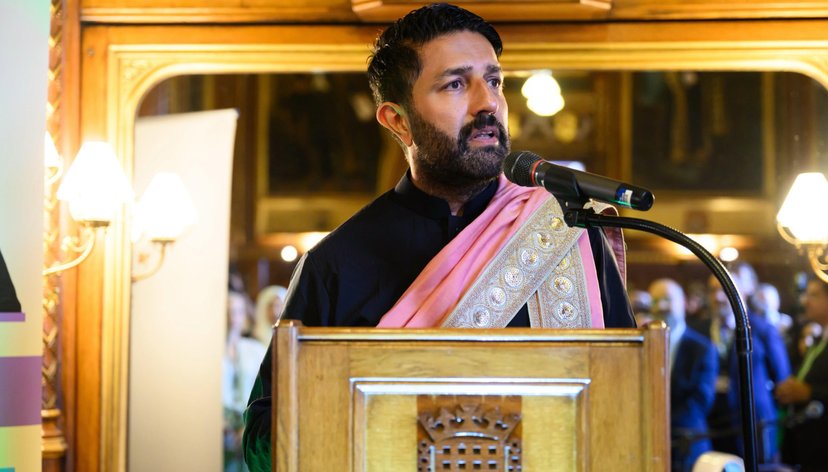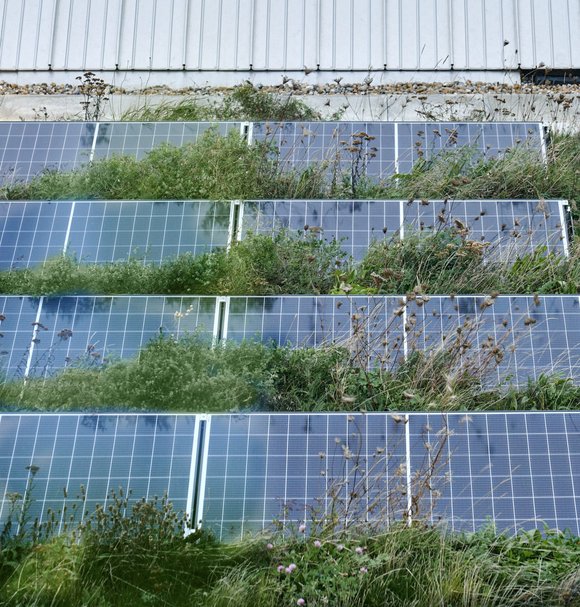Fully Funded Doctoral Landscape Studentship: NetZero Futures
Jump to
NetZero Futures Doctoral Landscape offers fully funded EPSRC studentships for PhD students starting in 2025. The application deadline for September 2026 admissions is Monday 19 January 2026.
Strategic Vision
Our NetZero Futures (NZF) Doctoral Landscape Award is a fully funded EPSRC scholarship with RCA. The strategic vision of NZF brings together RCA-wide Art and Design research within three core areas of research competence at the RCA; Circular Economy, Ecological Digital Citizens, and Robotics and AI, which align with the EPSRC Discovery priority of ‘Digital Futures’, and the Mission-Inspired priorities of ‘engineering net zero’, and ‘artificial intelligence’.
This vision is located within RCA’s strategic research priorities of Climate Crisis and the Circular Economy, and Design & AI, as well as the priority to enhance our doctoral research culture by attracting PhD candidates in fields directly aligned to RCA’s strategic research priorities.
The RCA has a track record of STEAM teaching and research, fostering an environment where staff and doctoral researchers with backgrounds in art, design, and STEM disciplines, particularly engineering, collaborate. Our community utilises design-led approaches to generate new insights and human-centred solutions for the major challenges of the 21st century. It is in this culture that we will locate our doctoral landscape candidates. The award will support research across the following themes:
- Circular Economy – Research led by the Centre for Materials Science & Culture, which headed one of the UKRI National Interdisciplinary Circular Economy programme (NICER) centres – the Textiles Circularity Centre (TCC), has revealed that successful adoption of sustainability practices requires the means for their enactment to be culturally embedded. TCC has focused on designing the means for people (consumers, businesses, NGOS, local govt) to practice circular economy within place-based settings. Achieving a circular economy requires a balance between technological innovation and social practices. Therefore, applications that investigate cultures of participation and cooperation among multi-stakeholder communities within complex, real-world systems are particularly encouraged.
- Ecological Digital Citizenship - Ecological Citizen(s) (EC) is a Network+ funded by EPSRC, defining, exploring and enacting Ecological Citizenship for a Sustainable Digital Society, funded until January 2027. The project explores tools, technologies and means to mobilise ‘Ecological Citizen(s)’ through accessible technology and community projects, to enable a sustainable digital society. We do not believe technology will ‘solve’ the problem, but it can; convene, empower and unite opportunities for technical evidence. For example Citizen Science approaches that empower communities and citizen(s), to negotiate change.
- Robotics and AI – The RCA Robotics Laboratory was established to deliver the RCA’s vision for design-led robotics and AI. Our research investigates how robotics can support safe, sustainable, and circular futures through creativity, critical design, and advanced technologies. A central focus is the Circular Economy for Industrial Robots programme, which challenges conventional approaches to how robots are conceived, used, and renewed across their life cycle. As part of this, for example, the EPSRC-funded Circular Robot 5.0 project explores how user- and planet-centred design, together with advances in artificial intelligence, can extend the life of robotic systems, making them more adaptable, repairable, and recyclable, thus supporting industries in the transition towards Net Zero.
The RCA’s NZF Doctoral Landscape Award provides an effective, supportive and inclusive ecosystem, creating a rich and diverse interdisciplinary research environment of expertise, facilities and networks, in which doctoral researchers will be supported to carve their own research path in the priority area of engineering.
Host Research Areas:
RCA’s NetZero Futures Doctoral Landscape Award
The RCA’s NetZero Futures Doctoral Landscape Award will provide an effective, supportive and inclusive ecosystem to support research in the priority area of engineering by creating a rich and diverse interdisciplinary research environment of expertise, facilities and networks in which doctoral researchers will be supported to carve their own research path.
We will offer a research culture that will promote and encourage doctoral researchers from either design or engineering backgrounds to pioneer research that supports industry, civil society, and citizens with net-zero solutions that holistically protect the health of the planet and its people.
The NZF Doctoral Landscape Programme will significantly impact society by advancing sustainable technologies, promoting and providing proven pilots for ecological citizenship, and developing innovative solutions to environmental challenges.
The programme addresses critical issues, including waste reduction, resource efficiency, and environmental resilience, by integrating robotics, circular economy principles, and sustainable design. Its human-centred, design-led approach enhances public awareness and encourages sustainable behaviours through community-based projects, contributing to societal well-being and sustainable behaviour change.
Please apply to the research host areas only.
Additional training
NetZero Futures offers all its funded students a comprehensive training programme that is designed to help you develop as a researcher and as a future leader in whatever career you choose. Training is to enhance your research and communication skills, and to develop you as a researcher so that you can achieve your full potential.
NetZero Futures students are expected to engage and participate in the research activities including the Doctoral Training Programme (DTP) three weeks per year of study. The Doctoral Training Programme offers a mix of practical workshops, research methods training and cohort development activities. Each School/Centre also offers a programme of lectures, seminars, workshops and group tutorials aimed at supporting discipline-specific aspects of the research.
Informative webinar
For more details on the NZF award, including application guidance, proposal requirements, interview preparation and a Q&A session, please watch this recording of the NZF informative webinar that took place on Tuesday 18 November 2025.
More information
Host Research Areas
- The Centre for Materials Science & Culture (Circular economy)
- The RCA Robotics Laboratory (Robotics)
- Ecological Digital Citizenship /School of Design (Sustainable design)
Project start date
Cohort 1: September 2025
Cohort 2: September 2026
Cohort 3: September 2027
Mode of study and duration
The RCA’s strategy to determine the studentship duration will be informed by the principles of equity and inclusion, ensuring we support each student appropriately with any individual needs. The duration will consider the nature of the individual student’s research project, academic background and personal circumstances. We will offer studentships for up to four years of study (pro-rated for part-time students). This period is inclusive of activities that may justify an extension to your funding, in line with the UKRI terms and conditions and can include participation in placement opportunities for up to 6 months (applications will be considered on a case by case basis). Further information about the extension scheme and other sources of EPSRC funding to support your research is available on the EPSRC website. We will require students and supervisors to develop a yearly timeline for the Annual Progress Review.
UKRI expects projects to be designed and supervised in a way that enables students to submit their thesis within the funded period i.e. by the funding end date. Therefore, your expected thesis submission date is the same as your funding end date.
Funding details
Stipend of £22,780.00 per academic year (full-time).
All funded students will receive any published yearly UKRI increases to the minimum Stipend.
The first stipend payment will be made on 1 October, with subsequent payments scheduled quarterly on the following dates:
1 January
1 April
1 July
Additional funds to support research and development
As an EPSRC funded student, you will be able to apply for additional funds to support your research and training. This is called the Research Training and Support Grant (RTSG). NetZero Futures can support students to attend conferences in the UK and abroad and undertake study visits and research trips. Students can apply for funds to support their own training and professional development, as well as initiatives to develop research communities for themselves and their peers.
Disabled Students’ Allowance
Disabled students who have been recruited to UKRI Research Council studentships are eligible to apply for additional financial support towards expenditure arising from their postgraduate studies incurred solely because of their disability. This additional financial support is commonly referred to as Disabled Students’ Allowances (DSA). The UKRI DSA Framework outlines the support available.
The RCA can also offer assistance to students applying for Disabled Students' Allowance (DSA) – for more information please visit the RCA Disability support page.
If you have a disability and require reasonable adjustments, please let us know as soon as possible after accepting your award, by emailing netzero.futures@rca.ac.uk so we can signpost you to the relevant teams to ensure adjustments are in place for you by the time you start. This applies whether or not Disability Student Allowance is claimed.
Terms and conditions
NetZero Futures (NZF) is funded by the Engineering and Physical Science Research Council (EPSRC), part of UK Research & Innovation (UKRI) and is a doctoral training partnership supporting PhD study in Engineering and Physical Science.
Full details of the terms and conditions of EPSRC postgraduate studentship awards can be found on the UKRI website.
- The award is conditional on you receiving and accepting an offer of a PhD place at the Royal College of Art and for the programme specified above. You should consult the Research Office at home institution immediately if your programme of study, mode of attendance or enrolment status changes as this may affect your entitlement to the studentship. In such circumstances the RCA may need to contact the EPSRC to determine whether the studentship can be maintained.
- Please note that the award must be taken up during the academic session specified above and cannot be deferred to the next academic year, or the award may be withdrawn. The studentship cannot normally start later than 1 October in the academic session, nor can it be transferred to another institution. Funding cannot be applied retrospectively and will only be effective from your first day of enrolment in the academic session specified above. If you would like to request a late start date in 2025/26 due to exceptional circumstances, please discuss this with your supervisors and email netzero.futures@rca.ac.uk in advance of your current award start date.
- Students in full-time employment are not eligible for an award of any kind from UKRI. A Student in part-time employment may be eligible for a part-time award, which should not be less than 50% full-time.
- Both home and international students must be resident in the UK for the majority of their studies and any time spent overseas should be for the purpose of fieldwork/long-term attachment.
- You are obliged to inform the Research Office at the RCA of any other funding you are receiving. Failure to do so may result in the withdrawal or termination of the award.
- You are expected to submit your thesis within the funded period.
How to apply: New students
Please indicate that you are applying for DLA NetZero Futures Studentship in your application and proposal, and please specify which research area you are applying to.
Potential applicants, who must normally meet the University's minimum requirements for postgraduate studies, should please review the information provided on the relevant link on how to apply, as well as the general guidance on the application process.
The application deadline for September 2026 admissions is Monday 19 January 2026.
How to apply: Registered RCA PhD students
Registered RCA PhD Students should submit the following:
Please provide details of your proposal, which should include the following (1,000 words)
- Significance and originality
- Underpinning ideas
- Aims and research questions
- Research design
- Methodology and/or
- Sources (including practice-based research)
Time for completion
Please provide a timetable for the completion of your proposed research
Note: UKRI expects projects to be designed and supervised in a way that allows students to submit their theses within the funded period, and no unfunded period should be assumed. Please provide a completion plan that aligns with this timeframe.
Personal statement (500 words)
Please provide a personal statement to include the following information:
- What knowledge, skills and training would you bring to the research?
- How and why is the proposed research suitable for EPSRC studentship?
- How would you seek to contribute to EPSRC?
- How might you want to engage with different audiences and organisations during your research?
Short supervisor statement
Please provide an update on your current progress in your studies (please additionally advise if you completed APR or Confirmation exam, submitted ethics application).
If you have already commenced doctoral study or will do so before September 2025, you may apply for funding for the remainder of your study, providing that, at the start of the AHRC award (1 October 2026), you will have at least 50% of the period of study remaining (excluding the ‘writing-up period’). If unsure, please contact us on netzero.futures@rca.ac.uk.
The application deadline for September 2026 admissions is Monday 19 January 2026. RCA registered students should submit their applications to: netzero.futures@rca.ac.uk


